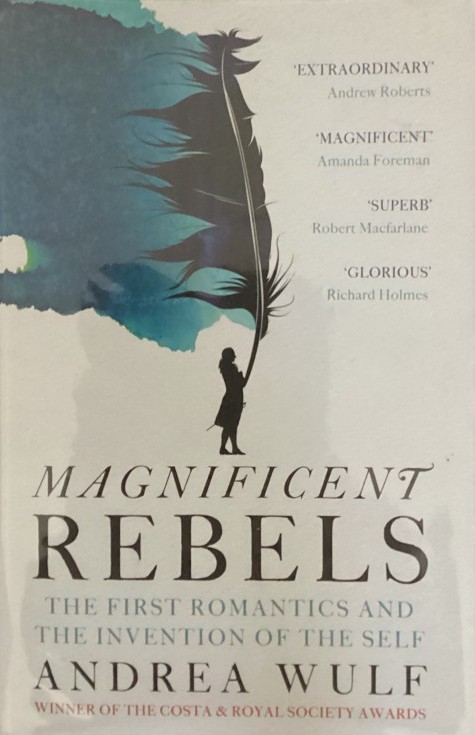Inspiring Older Readers
 posted on 26 Oct 2023
posted on 26 Oct 2023
Magnificent Rebels: The first Romantics and the invention of the self by Andrea Wulf
At the end of the 18th century revolution was in the air – politically and intellectually. The fires of the French Revolution had spread its demands for change in the social order from the streets and into the imaginations of a new generation of poets, writers and philosophers. It signals the emergence of a new ‘school’ of thought – Romanticism - a set of ideas that would focus attention on the individual, the self and its relationship to creation and the natural world.
Andrea Wulf’s remarkable book marries careful (even obsessive) academic research with a desire to tell the story of how these ideas were given shape and form in the crucible of a small town in Germany, Jena. In his review of the book for The Observer in 2022, Adam Sisman puts it in this way:
“….Jena, a quiet university town at the heart of Germany of only 800 houses and fewer than 5,000 inhabitants. For a brief period, as the 18th century gave way to the 19th, Jena had a claim to be the intellectual capital of Europe. The nation’s finest minds were gathered there.”
So, who were these famous minds. Some of them will possibly be familiar – Goethe, Schiller, Hegel and Alexander von Humbolt were names I’d come across before – but others are likely to be unfamiliar to most of us: the philosopher, Johann Fichte or the bohemian, Caroline Michaelis Böhmer Schlegel Schelling.
It is the personalities, their friendships, conflicts and passions that make this moment in history so dynamic and fascinating. There’s a chemistry here that can’t be manufactured on demand and which happens only occasionally but which can generate ideas that change the way we think and behave.
What, it’s fair to ask, lit the blue touch-paper that started the Romantic revolution? Wulf’s book suggests that this was the emergence of Johann Fichte’s ideas of the self (the ‘Ich’ as he called it). Fichte was hugely influenced by his dedicated reading of the philosophical works of Kant who he hugely admired. However, he came to reject a key plank of Kant’s thinking:
“He criticised Kant’s belief that the external world existed independently of the mind. The only certainty, Fichte told his students, was that the world was experienced by the self – by the ‘Ich’. The Ich, he said, ‘originally and unconditionally posits its own being’ and through this powerful initial act the ‘non-Ich’ – the external world that included nature, animals, other people and so on – came into existence.”
From this core idea all else flows. This view may not strike us here in the 21st century as especially revolutionary but, of course, at the end of the 18th century it was an incendiary idea to challenge the notion that we exist to sustain the rigid, formal role individuals had in subjugating themselves to the established social order.
The ideas of the Jena set would seep out to the likes of Coleridge, Wordsworth and others who would spread the message of Romanticism across Western literature and lead directly to our views on who we are today.
I have to say that reviews of this book have been phenomenal and, in my view, largely well deserved but it's also true that this isn’t likely to be a book for everyone. It’s weighty (in every way) and lengthy; it’s challenging; it’s demanding. Ultimately, I think it’s rewarding – but the rewards have to be worked for. As Adam Sisman’s review concludes:
“What was revolutionary is now standard: we are all romantics now. And all this began in a small town in Germany more than 200 years ago.”
The book is available in paperback and copies can be found for well under £10.
Terry Potter
October 2023